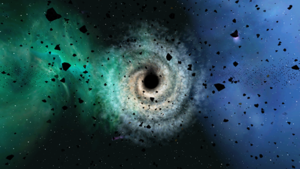
|
This wiki is closed in favour of the new wiki. Information shown is likely to be very out of date. |
Difference between revisions of "Black Hole"
Silverleaf81 (talk | contribs) m |
m |
||
| (3 intermediate revisions by 2 users not shown) | |||
| Line 1: | Line 1: | ||
<div style="font-size:40px; line-height:60px; color:red;">'''WARNING, NAVIGATIONAL HAZARD! '''</div> | <div style="font-size:40px; line-height:60px; color:red;">'''WARNING, NAVIGATIONAL HAZARD! '''</div> | ||
| + | |||
| + | [[File:Razgriz Black Hole.png|300px|thumb|left|Razgriz Black Hole in [[Omicron Phi]]]] | ||
A black hole is a theoretical entity predicted by the equations of general relativity. A black hole is formed when a star of sufficient mass undergoes gravitational collapse, with most or all of its mass compressed into a sufficiently small area of space, causing infinite spacetime curvature at that point (a ''singularity''). Such a massive spacetime curvature allows nothing, not even light, to escape from the ''event horizon'' or border. | A black hole is a theoretical entity predicted by the equations of general relativity. A black hole is formed when a star of sufficient mass undergoes gravitational collapse, with most or all of its mass compressed into a sufficiently small area of space, causing infinite spacetime curvature at that point (a ''singularity''). Such a massive spacetime curvature allows nothing, not even light, to escape from the ''event horizon'' or border. | ||
| − | Only one black hole is present in Sirius, [[Razgriz Black Hole | + | Only one black hole is present in Sirius, the [[Razgriz Black Hole]] located in [[Omicron Phi]]. If the star has a low mass for a black hole, they can become [[Neutron Star|Neutron Stars]]. Several theories have been made on the star [[New Berlin]], if they would become black holes or neutron stars, or if it will just collapse forming a black object. |
Getting close to the ''event horizon'' will result in nearly instant death. | Getting close to the ''event horizon'' will result in nearly instant death. | ||
| + | |||
| + | <br><br><br><br><br><br> | ||
| + | <hr> | ||
| + | <br> | ||
'''See Also''' | '''See Also''' | ||
| − | |||
[[Razgriz Black Hole]] | [[Razgriz Black Hole]] | ||
[[Neutron Star]] | [[Neutron Star]] | ||
| + | |||
| + | |||
| + | [[Category: Natural Phenomenon]] | ||
Latest revision as of 10:53, 7 June 2020

A black hole is a theoretical entity predicted by the equations of general relativity. A black hole is formed when a star of sufficient mass undergoes gravitational collapse, with most or all of its mass compressed into a sufficiently small area of space, causing infinite spacetime curvature at that point (a singularity). Such a massive spacetime curvature allows nothing, not even light, to escape from the event horizon or border.
Only one black hole is present in Sirius, the Razgriz Black Hole located in Omicron Phi. If the star has a low mass for a black hole, they can become Neutron Stars. Several theories have been made on the star New Berlin, if they would become black holes or neutron stars, or if it will just collapse forming a black object.
Getting close to the event horizon will result in nearly instant death.
See Also